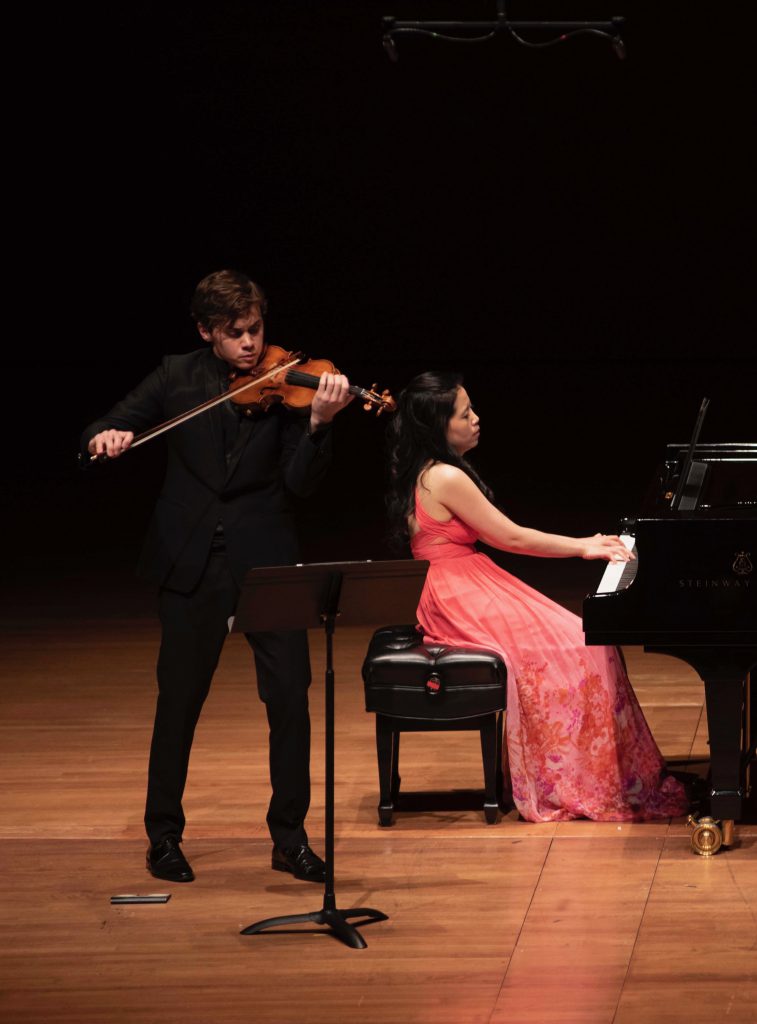Chamber Music Society opens with a non-Russian, Russian program

Benjamin Beilman and Gloria Chien performed Liszt in the season-opening concert by the Chamber Music Society of Lincoln Center Tuesday night. Photo: Tristan Cook.
Themed programs have become almost a genre of their own in concert life today. And in their first concert of the season, on Tuesday night, the Chamber Music Society of Lincoln Center took the idea to an extreme: “Russian Inspiration,” a themed program that didn’t actually have a theme.
In her curtain speech, Wu Han, CMS’s infectiously enthusiastic artistic director, even admitted as much. In advance of their Russo-centric winter festival, she quipped, they thought it would be fun to present “a Russian program with no Russian music”: a selection of works by Mozart, Schumann, Viotti, and others who “inspired” later Russian composers.
Russian or no, Tuesday’s program lacked the playful sense of discovery that characterizes most CMS concerts. Mozart’s Andante and Variations in G for Four Hands, K. 501, was nimbly performed by Gloria Chien and Michael Brown, but the piece itself is less than stimulating. Similarly, John Field’s Nocturne No. 2 in C minor felt flimsy in spite of Chien’s sensitive touch and lyrical instinct.
There was, in fact, one Russian item on the program: Mikhail Glinka’s Variations on a theme of Mozart, waltzing and twisting in a cheeky, charming rendition by Brown. Immediately following was Liszt’s Grand duo concertant sur “Le marin,” which proved to be the highlight of the first half. Violinist Benjamin Beilman showed a Kreislerian wit in his playing, in his pronounced rubato and portamento flirting with the boundaries of good taste without ever smothering the music.
Beilman and Ida Kavafian kicked off the program with Viotti’s Duo for Two Violins in G Major, W 4.9. The juxtaposition of the two made for an interesting contrast, Beilman’s warm, golden tone against Kavafian’s rougher sound. The Andante was a bit too straightforward to make much of an impression, but the pair showed a light, playful spirit in the closing Allegretto.
Robert Schumann’s Piano Quartet in E-flat, which closed the evening, was by far the most substantial piece on the program, and was no doubt meant to leave a grand final impression. There were flashes of excellence in this performance, but overall it was no more compelling than the rest of the program. The first movement was lively, but Kavafian was much less secure than she had been in the Viotti duo, showing wayward intonation and tense vibrato.
The Scherzo wasn’t steady enough to sustain the excitement of the moto perpetuo, and the Vivace finale was not especially vigorous. Only the Andante cantabile was truly effective, largely on the strength of the sighing melody introduced by cellist David Requiro and played with melting tenderness by master violist Paul Neubauer.
The most rewarding moment of the night came from the most unlikely source: Mendelssohn’s Song Without Words Op. 30, No. 1, a musical reverie of barely a few minutes. Gentle and warm, Chien’s rendition was exquisite, crafted in lyrical but unassuming phrases. Though over in the blink of an eye, this was a performance that captured the essence of the CMS experience at its best: unpretentious, earnest music-making.


